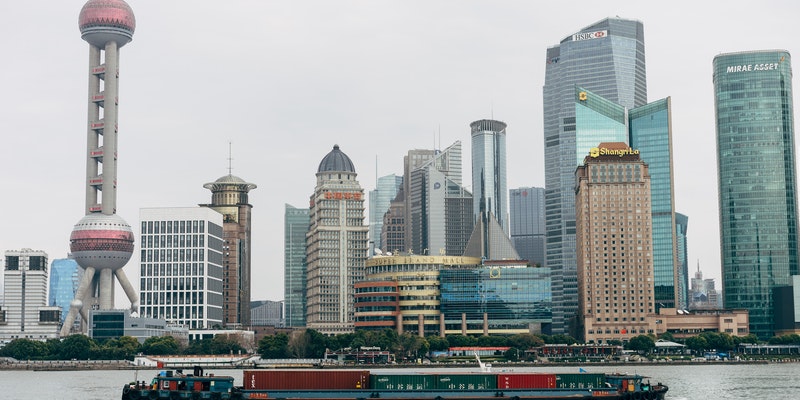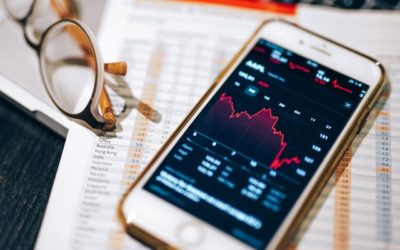Over the past few weeks, China has seen a severe uptick in the number of COVID-19 cases and deaths. This has not only raised alarms about a possible new wave of infections in Asia, but also in the rest of the world, creating new lockdown politics.
Unlike the most recent outbreaks, this one has been marked by super strict measures that have drawn the attention of governments and citizens of the world. At this point we all ask ourselves: what is happening and why are the Chinese authorities being more radical than at the beginning of the pandemic?
Of course, this super strict lockdown in China is already creating chaos in different parts of the world, and in the particular case of the United States this may mean another factor for the economy to worsen and inflation to increase.
We are going to explain how this situation affects the global economy, and what we can expect for the coming months. Is it possible that in the West we will face a new stricter confinement? Maybe… but first let’s take a closer look at what’s happening in China.
What is happening in China?
If there is something very important that we must take into account, it is that China, particularly in the city of Wuhan, was where it all began. By December 2019 the news of a virus in China was already spreading around the world, and just three months later the World Health Organization was already declaring the pandemic in which we still live.
For that reason. Many are alarmed and very aware of what is happening. In this case, the area affected by the outbreak and the strong lockdown is the city of Shanghai, with more than 25 million people.
This time it is not a new variant, but omicron spread again among the people of the city, registering record figures since the beginning of the lockdown. All this has generated chaos that has alarmed many due to:
- Separation of parents and children.
- Elderly isolation.
- Confinement of all the inhabitants of the city in their houses.
- Buildings fenced after detected cases.
- Pets killed by presumed contagion.
And many other measures that for the rest of the world seem to be more than exaggerated at this point in the pandemic.
Given this situation, the world economy is already beginning to be affected, and the crisis could worsen if other countries begin to register outbreaks of contagion, as has already been happening in Europe and the United States.
Let’s take a look at what’s happening in global markets and how this situation in Shanghai affects us all.
Stock market crash
For weeks, the US stock market and those of other countries have been at risk due in part to the health situation in China. This new lockdown could create huge logistical problems for many companies that are already facing difficult situations due to the war between Russia and Ukraine, and the very high inflation in the United States.
As we have told you in other article, the stability of the stock market is based on trust, and the new lockdown in China has made many people think that we are close to a new outbreak in the West, which could be particularly dangerous taking into account that almost all anticovid measures have already been lifted, and many citizens have not continued with their vaccination schedule.
In recent days, the results of the stock markets have had very poor performances, closing many with downward adjustments. The Nasdaq index has been one of the hardest hit, showing falls of up to 4%.
Another loss was reported by the S&P500 index, which reported a drop of 2.75%, as well as the Dow Jones, which reported losses of almost 2%.
Ads
On the other hand, there are the Shanghai and Shenzhen stock markets that fell by almost 7%, directly affected by the outbreak of COVID-19 along with other actions in the rest of Asia.
Europe has also been affected by the Chinese lockdown, the war, and US economic policies. The Paris stock market has shown falls of up to 2%, and the Milan, London, and Madrid stock markets have reported red numbers on constant days.
Undoubtedly, the problems that could be generated as a result of the confinement in China worry many investors, and if companies start to have logistical problems, the situation can worsen.
This reality connects us directly with the next point…
Supply chain problems due to the situation in China

China’s strict rules to curb the resurgence of COVID-19 may trigger another wave of chaos in supply chains in Asia, the United States and Europe.
The Chinese government is implementing a zero tolerance policy against COVID-19, which involves the suspension of commercial activities, including seaports and other essential tasks to complete the supply chain of various international companies.
Maritime transport congestion in Chinese ports, combined with Russia’s war in Ukraine, put at risk the immediate economic recovery and generates mistrust in the population.
If this situation persists, in a few weeks we would be seeing more shortages and inflation due to delays in supply chains that would further reduce the supply of products. The most serious thing about this delay is that it could extend throughout the year, as the departure of ships that are already stuck on Chinese shores returns to normal.
The CEO of Belgium’s Port of Antwerp, Jacques Vandermeiren, stated that they expect to see a bigger disaster than last year due to the situation in China. According to their analyses, it will have a large negative impact throughout 2022.
Since the pandemic began, the supply chains of many companies have been severely affected. As a result of more than two years of ongoing problems, research by Bloomberg showed that more than three-quarters of the world’s ports have experienced unusually long wait times.
Global trade expert Vincent Stamer predicts that supply chains will sadly no longer return to normal this year. He commented that the recovery of the ports could take at least 12 more months, only if no more such strict lockdowns are generated.
Exports
Of course, the greatest consequences of all this delay in the ports of China are suffered by exports.
Ads
The maritime traffic monitoring service, MarineTraffic, has carried out satellite monitoring of the waters between the coasts of China and Japan, and the situation for trade is worrying. According to the analysis, there are almost 500 ships stuck due to the lack of operation in the ports.
The Global Trade report also points out that there are about a thousand ships detained in different Chinese ports, which generates pressure on the cost of freight, not only in that area but worldwide. All this because such a large number of detained units means less movement of vessels in and out of Chinese waters.
The items that see the greatest delays in their distribution are washing machines, vacuum cleaners, solar panels, electronic components, and textiles. The asset management company, Janus Henderson, commented that the export of these products through the port of Shanghai represents 50% of the total distribution throughout the world, so the cessation of the operation will be hitting different markets very hard shortly.
The economics and finance professor at New York University in Shanghai explained that it will take a long time to resolve the backlog at the port, even if the restrictions are lifted tomorrow.
In a report published by Bank of America, various experts explained that although the authorities have already noticed the problems and began to take measures in recent days, these interruptions are likely to spread throughout the world within 3 to 6 weeks and last at least until the end of the second trimester.
Oil prices
Another value that has seen a lot of movement in recent weeks has been that of oil. Shanghai policies in addition to the crisis in the United States may further harm global growth and oil demand, which is why the price of crude oil has plummeted.
Brent oil recently fell by 4.06%, while West Texas presented recent falls by 3.5%, reaching the price of a barrel at $98 dollars. In total for a couple of months, the price of oil has fallen by 25%, after reaching its highest peak since 2008.
The price of crude oil also weakened on the prospect of a rise in interest rates in the United States, which is boosting the dollar. As the US currency gains strength, investors fear risk less and other currencies begin to suffer, as does oil.
Now, what can you do in the face of all this situation?

The first option will always be to save money. Putting your money in savings accounts that earn interest in some way can make your long-term finances look a little more stable.
If you already have a savings cushion that will sustain you for at least three months in the event of adverse economic situations, then it may be time to invest or diversify your portfolio.
Buying stocks at times like these when stock markets are reporting declines can offer you good future profits when price curves correct. Remember that when stock prices go down it’s time to buy, and when they go up it’s the perfect time to hold or sell.
Long-term bonds could also be another investment option for you. Particularly by taking on the risk longer, you can get a very good future return by the time the bond matures.
Of course, another excellent investment option is real estate. The real estate market has proven to be stable over the years, and when these types of problems occur in the supply and export chains, its price does not fall. Conversely, as long as the distribution of raw materials necessary for construction is affected, the real estate market may rise in value.
As negative as the whole picture may sound, things are as they are. We are currently facing serious financial problems, and more and more situations are endangering the global economy.
We are no longer talking about an unknown virus that threatens humanity, but about inevitable confinements in the face of a disease that we all already know very well. We also need to add natural disasters, wars, geopolitical conflicts, internal crises of countries, inflation, resource scarcity, and many other problems that affect a huge number of markets.
Perhaps this is the best time for you to ask yourself: What will you do with your money to protect it? Are we close to a resurgence in the West?
Leave a comment and let us know what you think of this whole situation!



